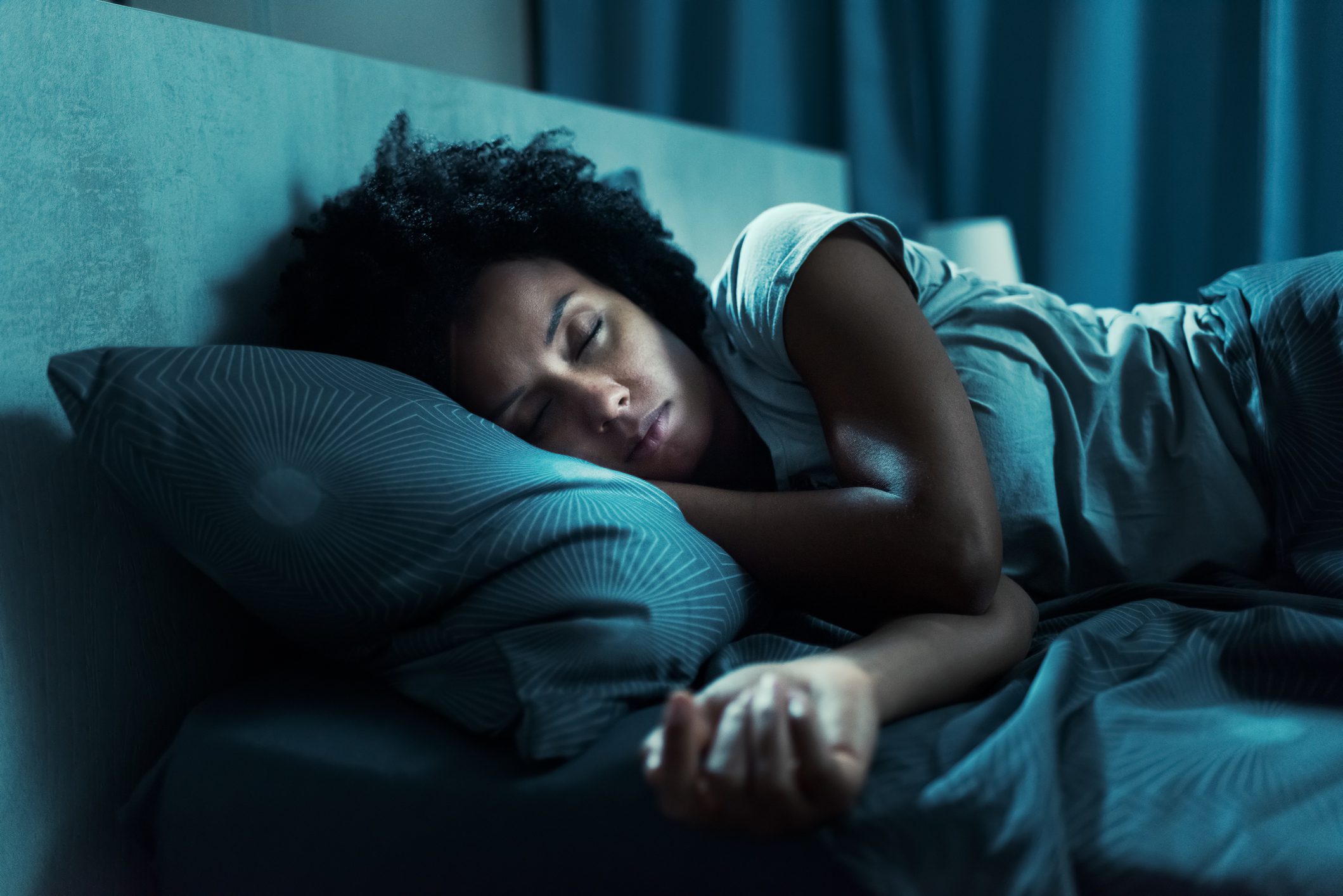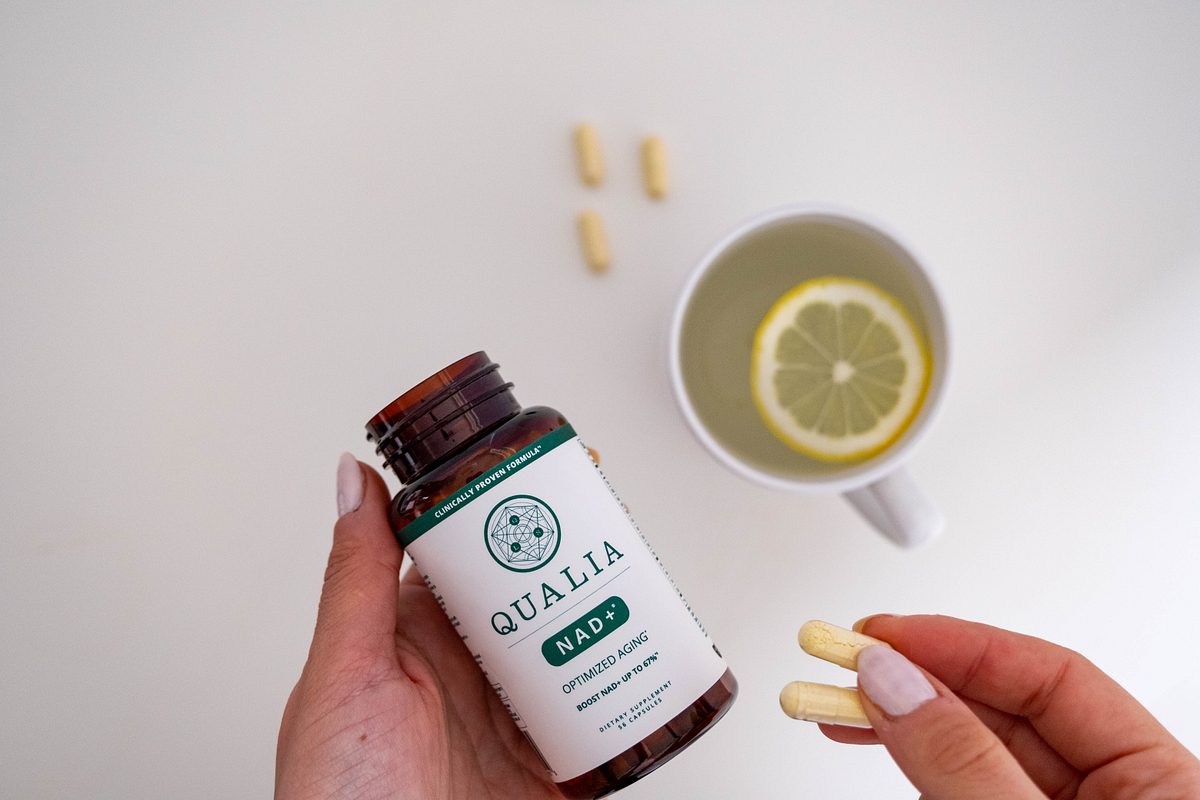As a busy entrepreneur with two flourishing companies, my schedule is incredibly tight. Regardless how crazy my life gets, the one thing I never compromise on is great sleep. When I don’t meet my sleep quota, I can’t show up as my best the next day.
The sleep-deprived “hustle” culture has become the new normal; sleep less and get more done. I recently saw an ad that suggested cutting back an hour on your sleep to fit in a morning workout. (File under bad ideas.)
Subpar shuteye leaves you feeling tired, spacey, cranky, and hangry. You’re more apt to make poor food choices, neglect tiny details at your job, and make impulsive decisions.
Quantity matters—you’ll want to aim for seven to nine hours of sleep every night (and I’d love for you to get at least eight!). But so does quality: those eight hours should be solid and uninterrupted. No difficulty falling asleep, waking up too early, or waking up in the middle of the night.
Years ago, a study found that one partial night of poor sleep (over eight hours one night and four hours the next) could increase the risk of insulin resistance. Long-term, this sets you up for diabetes and weight gain (and this was in healthy participants!).1
That’s just one consequence. As you’ll see, poor sleep can derail your health and happiness, impacting your brain, gut, waistline, immune health, and so much more.
Sleep and Your Brain Health
Can’t concentrate on your work? This can be the aftermath of a poor night’s sleep, which can impair concentration, attention, decision-making, and memory. Studies show that compared with people who sleep well, those with sleep disorders such as insomnia find performing even simple daily tasks and maintaining attention difficult.2
But sleep deprivation can do more to your brain than impact your concentration and attention. It can also increase your risk of mood disorders like depression and anxiety. Research shows that sleep disturbances are the most prominent symptom in people who struggle with depression.3
Preventing the risk of brain-related diseases also depends on optimal sleep. Your brain does a “spring cleaning” when you sleep, through what’s called the glymphatic system. It’s your brain’s waste-clearance system that helps remove toxins and other waste products that build up throughout the day.
“At night, the brain also detoxifies,” says Satchin Panda, PhD, in The Circadian Code. “During the daytime, brain cells absorb and process nutrients, creating unwanted toxic by-products. These toxins are cleaned up when we sleep, and new brain cells are created.”
If this waste clearance isn’t happening, it affects your brain function and increases the risk of neurodegenerative disease.4
Sleep and Your Immune System
Poor sleep also impairs your immune system, making you more susceptible to whatever bug is going around the office.5
Studies show that lack of sleep impairs white blood cells that fight infections.6 A strong immune system has a solid army of white blood cells. Think of them as soldiers that protect your body from invaders like viruses, bacteria, and other harmful substances.
Like an army, your immune system has commanders who rally those troops to fight. We call these messengers cytokines. They regulate the immune system, gather white blood cells, and increase blood flow to the site of injury. Cytokines also ensure that acute inflammation, a natural immune response, doesn’t become damaging and potentially deadly chronic inflammation.
When you don’t get enough sleep, your body produces fewer cytokines, making it harder to fight off infections and calm chronic inflammation. Left unchecked, this kind of inflammation can contribute to autoimmune disease, cancer, cardiovascular disease, and more.7
Sleep and Your Gut Health
Sleep and gut health are a two-way street. When one suffers, both take the hit.
When I say gut health, I’m referring to the trillions of bacteria that inhabit the gut. You want a diverse range and balance of healthy bacteria to function well. Antibiotics, chronic stress, environmental toxins, and bad sleep can negatively impact this diversity, creating an imbalance that we call dysbiosis. Quality, quantity, and function of the bacteria all suffer in the face of poor sleep.8, 9
Dysbiosis can have a wide-ranging impact on your sleep. How?
Those bacteria regulate your circadian rhythm, the internal 24-hour clock that supports healthy sleep-wake cycles. Imbalances among gut bacteria can disrupt that rhythm, leading to sleep problems.
Your gut produces brain chemicals called neurotransmitters. Among them include serotonin (which goes on to make melatonin, your sleep-regulating hormone) and calming gamma-aminobutyric acid (GABA). When gut bacteria fall out of balance, so do serotonin and GABA,making it harder to relax and fall asleep. 11
Sleep and Maintaining a Healthy Weight
Over my four decades helping people lose weight, one consistent pattern has emerged: when people don’t sleep well, weight loss becomes much harder.
Studies confirm this: compared with folks who got seven or eight hours of sleep, the risk of developing obesity increased by 15% in people who slept five hours or less every night. Researchers found that even six hours can raise your obesity risk by 6%.12
Hormones are a huge driver behind weight-loss resistance. When you don’t sleep well, your hunger hormone ghrelin increases, whereas your leptin, the hormone that signals fullness, slows down.13
As a result, you have more cravings for sugary, processed foods. Feeling tired means you’re more likely to blow off your workout. Plus, you’re often stressed out, and not always for any specific reason. There’s a reason why: lack of sleep can increase cortisol, your primary stress hormone. When cortisol stays elevated when it shouldn’t be, it can stimulate the storage of abdominal fat.14
Sleep and Blood-Sugar Balance
Too often, I see people who don’t sleep well reach for things like a low-fat muffin and a “skinny” latte. When you’re not sleeping well, your blood-sugar levels are already out of balance. Reaching for a caffeinated, sugary jolt only makes them worse.
One review of seven randomized control trials connected sleep deprivation and poor sleep quality with blood-sugar imbalances and reduced insulin sensitivity.15 (Insulin sensitivity means your cells can easily use glucose for energy. When they can’t, those cells “resist” glucose, leading to resistance that can create the pathway for obesity and diabetes.)
As I mentioned above, subpar sleep also impacts cortisol. When this stress hormone stays elevated, insulin resistance and dangerous belly fat are more likely to occur.
Great sleep keeps your blood-sugar levels steady. When you maintain stable blood-sugar levels, you’re more focused, energized, and less tempted to reach for sugary snacks.
The Secret for Better Sleep
Hitting the snooze button, waking up groggy, and reaching for a third cup of coffee to get your morning started can have wider-reaching repercussions than you may imagine. Simply put, bad sleep will impact every area of your life.
To remedy that, start by finding a sleep ritual that works for you. Mine includes a hot bath, chamomile tea, a novel, and meditation. Keep your room at about 68°, use blackout curtains, keep a white-noise machine in the background if you need it, and use a sleep mask.
What you eat can also have a dramatic impact on sleep. Foods rich in the mineral magnesium can improve sleep quality so you’re not feeling tired or groggy throughout the day. 16
A protein-first approach can steady your blood sugar, helping you stay calm and sleep better, but it plays a more direct role with sleep, too. The amino acid tryptophan increases the production of melatonin, a hormone that regulates circadian rhythm. That’s one reason why studies show that higher protein intake can improve sleep among middle-aged folks.17
Along with optimal protein, I find that taking melatonin supplements can benefit almost everyone. One review found that supplementing with melatonin can help you fall asleep faster, improves your sleep quality and quantity, and may help support sleep disorders such as insomnia.18
Even though protein helps support melatonin production, I also recommend that you use a supplement. Studies show that your body makes less melatonin as you age, which means that your sleep can take a nosedive.19
Melatonin works well on its own, but it performs even better with other calming nutrients including L-theanine (the same amino acid in green tea) and inositol. A high-quality sleep formula ensures that you meet your sleep quota every single night.
Transform Your Sleep: Introducing the Optimal Sleep Kit
When you don’t sleep well, everything suffers. You’re mentally foggy, running on empty, cranky, and little tasks become huge challenges. Reaching your goal weight is harder, your blood sugar spikes and plunges, and you increase your risk of disease.
Optimizing your overall health starts by getting deep, replenishing sleep every single night. That’s why I designed my Optimal Sleep Kit, which provides an easy-to-follow, actionable blueprint for the best sleep of your life.
The program features an Optimal Sleep Guide, covering everything you need to know to confidently get stellar shuteye every night. You’ll learn what foods to eat and avoid, the workout plan supports quality sleep, how to manage stress and other sleep saboteurs, plus a seven-day meal plan including nutritious, easy-to-prepare meals and loaded smoothie recipes.
The kit also includes science-backed supplements that work with your body to ensure you get deep, replenishing sleep every night:
- Sleep Candy™ combines 3 mg of melatonin with 5-HTP, vitamin B6, inositol, and L-theanine. These nutrients work as a team to support healthy sleep and overall relaxation.*
- Magnesium Body Calm provides a targeted dose of highly bioavailable chelated magnesium, which doesn’t create gastric upset or other problems like many magnesium supplements do. Among its many duties, magnesium promotes calm and improves both the quality and quantity of sleep.*
Sleep issues can impact your brain, gut, immune system, weight loss, and so much more. Stop settling for “just OK” sleep. Deep, replenishing sleep is the key to vitality, abundant energy, and a healthy weight.
When you’re ready to take your sleep to the next level, my Optimal Sleep Kit contains everything you need to get the best sleep of your life! Learn more and purchase the program here.
*These statements have not been evaluated by the Food & Drug Administration. Products mentioned are not intended to diagnose, treat, cure, or prevent any disease. The views in this blog by JJ Virgin should never be used as a substitute for professional medical advice. Please work with a healthcare practitioner concerning any medical problem or concern.
References:
- Donga E, van Dijk M, van Dijk JG, Biermasz NR, Lammers GJ, van Kralingen KW, Corssmit EP, Romijn JA. A single night of partial sleep deprivation induces insulin resistance in multiple metabolic pathways in healthy subjects. J Clin Endocrinol Metab. 2010 Jun;95(6):2963-8. doi: 10.1210/jc.2009-2430. Epub 2010 Apr 6. PMID: 20371664.
- Miller CB, Robertson DJ, Johnson KA, Lovato N, Bartlett DJ, Grunstein RR, Gordon CJ. Tired and lack focus? Insomnia increases distractibility. J Health Psychol. 2021 May;26(6):795-804. doi: 10.1177/1359105319842927. Epub 2019 Apr 22. PMID: 31007074.
- Fang H, Tu S, Sheng J, Shao A. Depression in sleep disturbance: A review on a bidirectional relationship, mechanisms and treatment. J Cell Mol Med. 2019 Apr;23(4):2324-2332. doi: 10.1111/jcmm.14170. Epub 2019 Feb 7. PMID: 30734486; PMCID: PMC6433686.
- Jessen NA, Munk AS, Lundgaard I, Nedergaard M. The Glymphatic System: A Beginner’s Guide. Neurochem Res. 2015 Dec;40(12):2583-99. doi: 10.1007/s11064-015-1581-6. Epub 2015 May 7. PMID: 25947369; PMCID: PMC4636982.
- Garbarino S, Lanteri P, Bragazzi NL, Magnavita N, Scoditti E. Role of sleep deprivation in immune-related disease risk and outcomes. Commun Biol. 2021 Nov 18;4(1):1304. doi: 10.1038/s42003-021-02825-4. PMID: 34795404; PMCID: PMC8602722.
- Said EA, Al-Abri MA, Al-Saidi I, Al-Balushi MS, Al-Busaidi JZ, Al-Reesi I, Koh CY, Idris MA, Al-Jabri AA, Habbal O. Sleep deprivation alters neutrophil functions and levels of Th1-related chemokines and CD4+ T cells in the blood. Sleep Breath. 2019 Dec;23(4):1331-1339. doi: 10.1007/s11325-019-01851-1. Epub 2019 Apr 30. PMID: 31041780.
- Furman D, Campisi J, Verdin E, Carrera-Bastos P, Targ S, Franceschi C, Ferrucci L, Gilroy DW, Fasano A, Miller GW, Miller AH, Mantovani A, Weyand CM, Barzilai N, Goronzy JJ, Rando TA, Effros RB, Lucia A, Kleinstreuer N, Slavich GM. Chronic inflammation in the etiology of disease across the life span. Nat Med. 2019 Dec;25(12):1822-1832. doi: 10.1038/s41591-019-0675-0. Epub 2019 Dec 5. PMID: 31806905; PMCID: PMC7147972.
- Han M, Yuan S, Zhang J. The interplay between sleep and gut microbiota. Brain Res Bull. 2022 Mar;180:131-146. doi: 10.1016/j.brainresbull.2021.12.016. Epub 2022 Jan 13. PMID: 35032622.
- Matenchuk BA, Mandhane PJ, Kozyrskyj AL. Sleep, circadian rhythm, and gut microbiota. Sleep Med Rev. 2020 Oct;53:101340. doi: 10.1016/j.smrv.2020.101340. Epub 2020 May 13. PMID: 32668369.
- Cooper CB, Neufeld EV, Dolezal BA, Martin JL. Sleep deprivation and obesity in adults: a brief narrative review. BMJ Open Sport Exerc Med. 2018 Oct 4;4(1):e000392. doi: 10.1136/bmjsem-2018-000392. PMID: 30364557; PMCID: PMC6196958.
- Taheri S, Lin L, Austin D, Young T, Mignot E. Short sleep duration is associated with reduced leptin, elevated ghrelin, and increased body mass index. PLoS Med. 2004 Dec;1(3):e62. doi: 10.1371/journal.pmed.0010062. Epub 2004 Dec 7. PMID: 15602591; PMCID: PMC535701.
- Sweatt SK, Gower BA, Chieh AY, Liu Y, Li L. Sleep quality is differentially related to adiposity in adults. Psychoneuroendocrinology. 2018 Dec;98:46-51. doi: 10.1016/j.psyneuen.2018.07.024. Epub 2018 Jul 25. PMID: 30098512; PMCID: PMC6204309.
- Tiwari R, Tam DNH, Shah J, Moriyama M, Varney J, Huy NT. Effects of sleep intervention on glucose control: A narrative review of clinical evidence. Prim Care Diabetes. 2021 Aug;15(4):635-641. doi: 10.1016/j.pcd.2021.04.003. Epub 2021 Apr 10. PMID: 33849816.
- Arab A, Rafie N, Amani R, Shirani F. The Role of Magnesium in Sleep Health: a Systematic Review of Available Literature. Biol Trace Elem Res. 2023 Jan;201(1):121-128. doi: 10.1007/s12011-022-03162-1. Epub 2022 Feb 19. PMID: 35184264.
- Sutanto CN, Loh WW, Toh DWK, Lee DPS, Kim JE. Association Between Dietary Protein Intake and Sleep Quality in Middle-Aged and Older Adults in Singapore. Front Nutr. 2022 Mar 9;9:832341. doi: 10.3389/fnut.2022.832341. PMID: 35356724; PMCID: PMC8959711.
- Ferracioli-Oda E, Qawasmi A, Bloch MH. Meta-analysis: melatonin for the treatment of primary sleep disorders. PLoS One. 2013 May 17;8(5):e63773. doi: 10.1371/journal.pone.0063773. PMID: 23691095; PMCID: PMC3656905.
- Vural EM, van Munster BC, de Rooij SE. Optimal dosages for melatonin supplementation therapy in older adults: a systematic review of current literature. Drugs Aging. 2014 Jun;31(6):441-51. doi: 10.1007/s40266-014-0178-0. PMID: 24802882.






